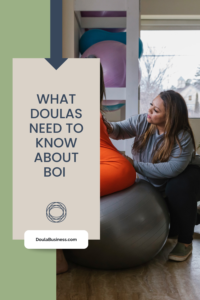
Update: December 23, 2024
The court’s decision to stay BOI reporting requirements has been reversed. As of this date, BOI reporting is officially back in effect. Deadlines have been updated, and most businesses—including many doula practices—must now file Beneficial Ownership Information with FinCEN. Read on for the latest details and compliance steps to ensure your business stays on track.
If you’ve heard the term BOI and thought, “What does that mean, and does it apply to me as a doula?”—you’re in the right place. BOI, or Beneficial Ownership Information, is a government requirement designed to identify who owns or controls a business. For doulas, whether or not you need to file depends on your business structure. Let’s explore what this means for your doula business.
BOI requirements were created to prevent illegal activities like money laundering or fraud. For small business owners, including doulas, it’s a way to ensure transparency about who is running the business. If your doula practice is structured as a registered business entity—like an LLC or corporation—you may need to file BOI. But if you’re working solo as a sole proprietor without a formal LLC, the rules are different.
Does Your Doula Business Need to File BOI?
Here’s the key: whether you need to file depends on your business structure.
- Sole Proprietor (No LLC): If you’re working alone under your name and haven’t registered as an LLC or corporation, you’re considered a sole proprietor. Good news: you don’t need to file BOI.
- LLC or Corporation: If you’ve formed an LLC to separate your personal finances from your doula business, or if you’re part of a corporation, you’ll likely need to file BOI. This includes single-member LLCs (just you) and multi-member LLCs (you and a business partner).
- Other Exceptions: If your doula business has over 20 employees and $5 million in revenue, congratulations! You’re likely exempt from filing BOI under these specific thresholds.
If you’re unsure about your business type, it’s worth confirming with a legal or tax professional.
What is the deadline to report?
As of December 23, 2024, the requirement to file Beneficial Ownership Information (BOI) with FinCEN has been reinstated. Deadlines vary depending on when your business was created or registered:
- If your business was created before January 1, 2024, you must file by January 13, 2025.
- If your business was created between September 4 and December 23, 2024, you must also file by January 13, 2025.
- If your business was created between December 3 and December 23, 2024, you have an additional 21 days from your original filing deadline.
- If your business was created on or after January 1, 2025, you must file within 30 days of your creation or registration date.
- Businesses qualifying for disaster relief should follow the later applicable deadline.
These deadlines are subject to change, so it’s important to stay informed by visiting FinCEN’s official website for the latest updates and guidance.
What Information Do Doula Businesses Need to Report?
If you’re required to file, here’s the information you’ll typically need:
- Business Details:
- Legal name of your doula business (e.g., “Your Name Doula Services, LLC”).
- Your business address.
- Your EIN (Employer Identification Number), if you have one.
- Owner Information:
For each person owning 25% or more of the business or with significant control:- Full name.
- Date of birth.
- Residential address.
- A government-issued ID, like a driver’s license or passport.
- Manager or Controller Information:
If no one owns at least 25%, you’ll provide details about the individual(s) responsible for decision-making, such as a manager or partner.
What Happens If You Don’t File BOI?
Failing to file can lead to fines or other legal consequences, so it’s important to get this right. Filing is typically done through a secure online portal, such as the one managed by FinCEN (the Financial Crimes Enforcement Network).
Common Doula Business Examples
- Example 1: Sole Proprietor
Alex is a birth doula working solo under their own name, using their Social Security Number for taxes instead of an EIN. Alex is a sole proprietor, so no BOI filing is needed. - Example 2: LLC Doula Practice
Taylor started “Taylor’s Doula Services, LLC” to create a legal separation between personal and business finances. Since this is a registered LLC, Taylor needs to file BOI and provide their personal information. - Example 3: Multi-Member LLC
Jordan and Casey co-own an LLC called “Heart and Hands Doula Collective.” They’ll each need to submit their information as part of the BOI filing.
A Quick Note: This Isn’t Legal or Financial Advice
I’m a doula, not a lawyer or a CPA. My goal is to make this information as clear and practical as possible, but it’s always best to seek professional legal and/or financial advice to ensure you’re meeting your specific obligations.
What Doula Office Hours Members Get
One of the things we do for Doula Office Hours members is bring in specialists, like the lawyer we have coming soon, so they can ask their questions as a perk of membership.
By staying informed and proactive, you can focus on what you do best: supporting your clients. Let’s work through these details together and keep your business running smoothly.







